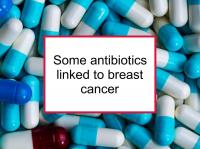The possibility that antibiotics might cause breast cancer was first given a lot of attention upon publication of a 2004 study that reported a connection between the two. The study was roundly criticized by other researchers at the time for its lack of control for other patient characteristics known to be associated with breast cancer risk.
Studies published since then have reported inconsistent results. Some very large population studies have been undertaken to try to settle this question. The prescription and cancer databases that facilitate such large studies typically are not able to provide data concerning confounding factors for the participants. Therefore, it is possible that the use of antibiotics simply reflects health deficits such as chronic inflammation, chronic infection, or a weakened immune system that in themselves contribute to increased breast cancer risk.
However, available evidence suggests on balance that some antibiotics might promote breast cancer in some women. For example, a 2022 study reported that higher numbers of antibiotic prescriptions and antibiotic varieties prescribed both were linked to increased breast cancer-specific mortality among women with triple negative (ER-/PR-/HER2-) breast cancer. A 2024 study found that antibiotic treatment reduced the treatment effect of tamoxifen in mice.
Some antibiotics have been linked to increased breast cancer risk
The following antibiotics and antifungals have been reported to be associated with increased breast cancer rates in at least one study:
- Cephalosporins such as Keflex (cephalexin)
- Cipro (ciprofloxacin)
- Flagyl (metronidazole)
- Garamycin (gentamicin)
- Grisovin (griseofulvin)
- Nitrofurans such as Macrobid
- Penicillins
- TMP/SMX drugs such as Septra or Bactrim (trimethoprim/sulfamethoxazole or cotrimoxazole)
- Tetracyclines such as Sumycin, Terramycin, Tetracyn, and Panmycin.
Avoiding these particular antibiotics would not solve the problem since some studies have reported increased risk for antibiotic exposure generally without specifying particular brands or classes of antibiotics.
Future studies might produce more specific and definitive results concerning individual antibiotics and breast cancer risk by subtype, age of diagnosis or other characteristics. In the mean time, we suggest making every effort to avoid long-term antibiotic use for less serious conditions. Generally speaking, topical antibiotics (if effective for a given condition) are preferable to oral antibiotics.
Possible reasons for link between antibiotics and breast cancer
Several explanations have been proposed for the possible connection between antibiotic use and breast cancer. Antibiotics affect multiple organs, not just the bacteria they are intended to combat. Antibiotics reduce the diversity of intestinal microflora and may interfere with the ability of such microflora to metabolize plant phytochemicals into compounds that protect against cancer. Antibiotic use also affects the immune system and inflammation in ways that may increase breast cancer risk. In addition, antibiotics have been shown to disturb bone metabolism, with unknown effects on the potential to develop bone metastases.
There is also evidence that antibiotics may affect breast tissue directly. Breast tumor tissue and paired normal adjacent tissue from the same women using antibiotics have been found to contain different types and levels of bacteria. Total bacterial DNA load has also been found to be reduced in tumor versus paired normal tissue in antibiotic users.
A study of mice that spontaneously develop mammary tumors that overexpress HER-2/neu (HER2+) found that mice administered either Garamycin or a combination of Cipro and Flagyl developed more tumors than similar untreated mice. The mammary glands of the treated mice were found to have more numerous and more developed terminal ductal lobular units than control mice. This suggests that the breasts themselves may be altered by antibiotic exposure.
Antibiotics in food
Antibiotics are routinely administered to livestock (including poultry) and farmed fish to help reduce infections in the crowded conditions in which they are raised. Milk typically contains measurable quantities of antibiotics. Based on this and other evidence concerning these foods and the risk of breast cancer, intake of beef, pork, lamb, and milk should be limited, and organic rather than non-organic chicken (and other poultry) should be purchased, if possible. Wild caught salmon and other fatty fish are preferable to farm raised fish because they normally have higher omega-3 content, in addition to not having been raised using antibiotics and pesticides.
Bottom line
Based on the available evidence, the association between overall antibiotic use and breast cancer is not strong and causality has not been demonstrated. Serious infections can be deadly or cause permanent injury and should be treated appropriately. However, women should continue to follow the prevailing medical advice to limit antibiotic use to when it is strictly medically necessary.
Sources of information in this webpage
The information above, which is updated continually as new research becomes available, has been developed based solely on the results of academic studies. Clicking on any of the underlined terms will take you to its tag or webpage, which contain more extensive information.
Below are links to 20 recent studies concerning this topic. For a more complete list of studies, please click on antibiotics.
